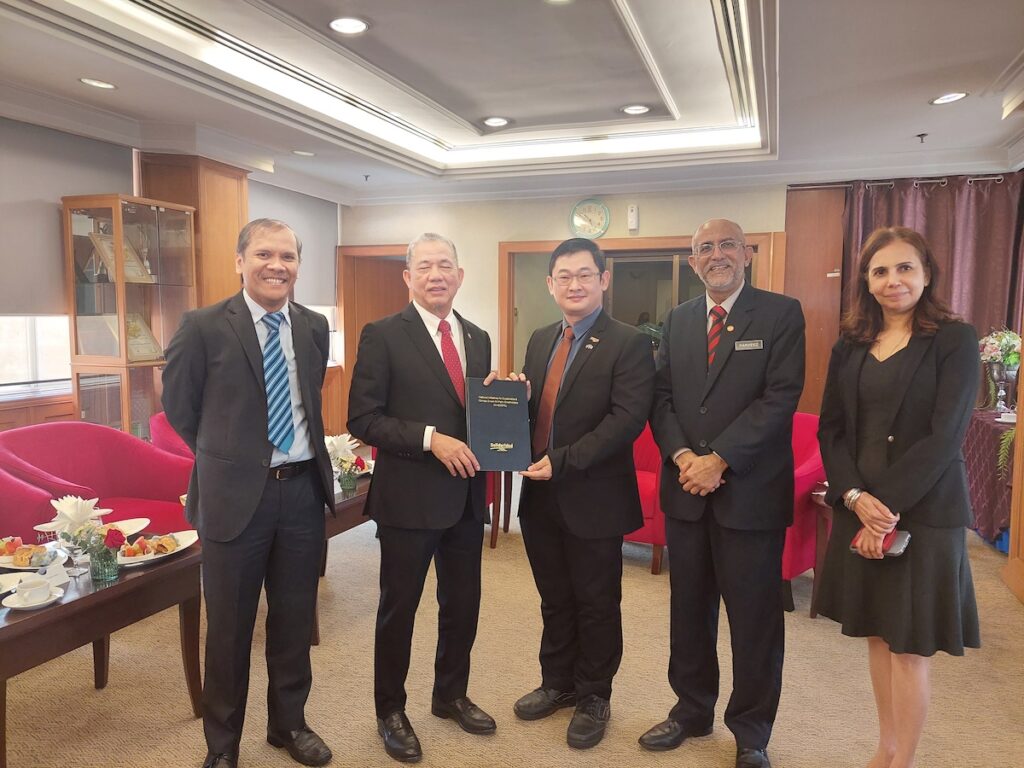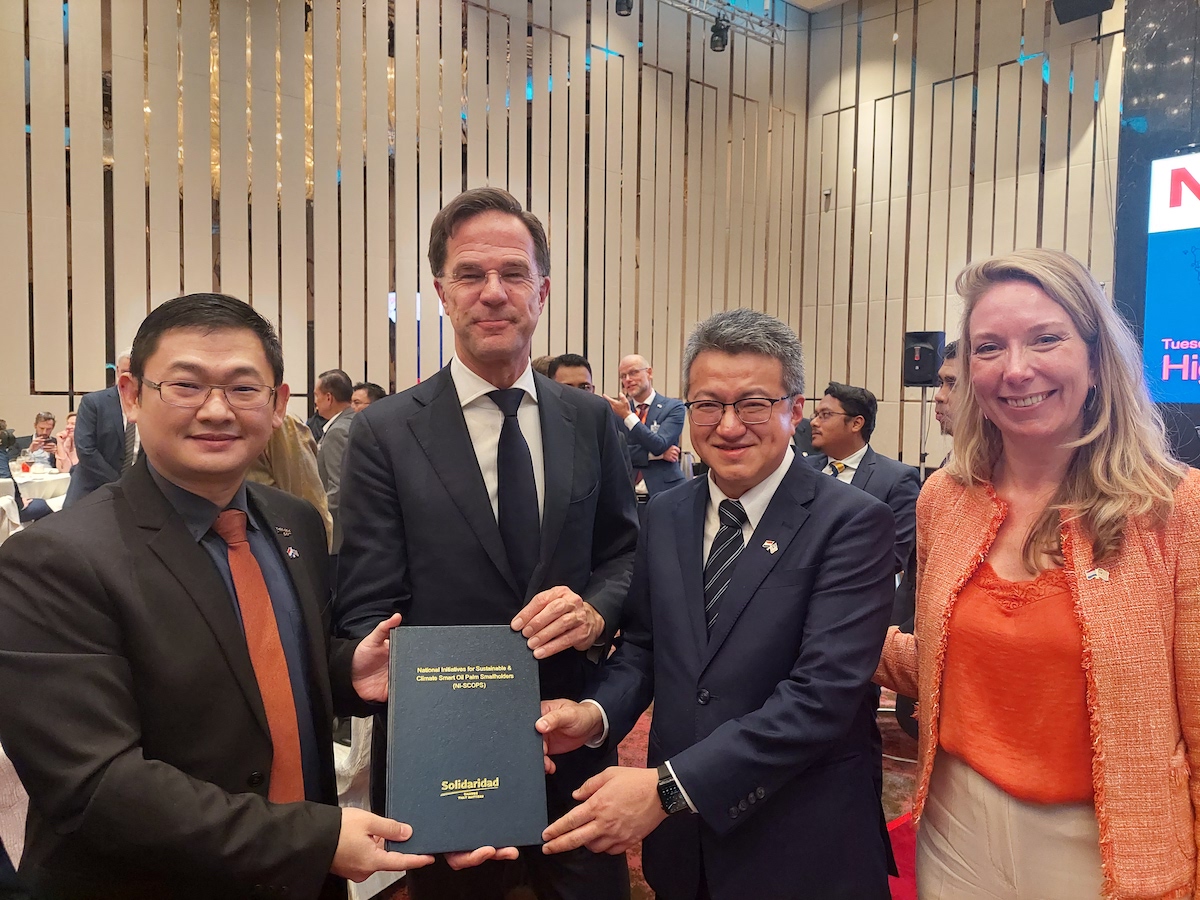Law Chu Chien, the Country Manager of Solidaridad Malaysia, submits a memorandum on behalf of oil palm smallholders to Dutch Prime Minister Mark Rutte.
During his visit to Malaysia in October of 2023, Malaysian palm oil smallholders submitted a memorandum to the Prime Minister of the Netherlands, Mark Rutte, which outlined their challenges in accessing European and global markets. The memorandum, submitted on their behalf by Solidaridad, comes against the backdrop of the European Union’s Deforestation Regulation that seeks to ban the sale of palm oil produced on deforested land.
Smallholder palm oil producers in Malaysia and Indonesia (who account for nearly 28% and 40% of the global palm oil output, respectively), as well as their respective governments, have voiced concerns about the new regulation and the stringency of its provisions which could potentially exclude small farmers from the European and global supply chains and markets. The memorandum states that, “The recent adoption of the EU Deforestation Regulation (EUDR) would place further constraints to our ability to enter the already hard to access international market.”

Signatories to the memorandum include representatives of the Sarawak Dayak Oil Palm Planters Association (DOPPA), National Association of Smallholders Malaysia (NASH), Persatuan Veteran Angkatan Tentera Malaysia (PVATM) Sarawak, Dayak National Congress (DNC), Koperasi Pekebun Kecil Telagus Balai Ringin Serian Berhad, as well as village heads, community leaders and the leaders of farmers’ groups.
Under its National Initiatives for Sustainable and Climate-Smart Oil Palm Smallholders (NI-SCOPS) programme, Solidaridad in Asia has focused on projects to develop environmentally sustainable oil palm agriculture, while empowering oil palm smallholders through increased yield, improved access to market and readiness to comply with national sustainability standards, like the Malaysian Sustainable Palm Oil (MSPO) and Indonesia Sustainable Palm Oil certification (ISPO).
We (PVATM) strongly support Solidaridad Network Malaysia in Sarawak so that they can continue a programme like NISCOPS in the future.
Jimbau Anak Galau, President of PVATM Sarawak
In both countries, the programme enjoys the support of key government and private stakeholders. Solidaridad aims to reduce deforestation and mitigate climate change through enhanced climate-adaptive practices by oil palm smallholders. The NI-SCOPS project includes support for climate-smart and regenerative agricultural practices, while it works hard to stop agricultural encroachment in forested areas.
The memorandum acknowledges the benefits of the NI-SCOPS programme and the ongoing work by the governments of Malaysia and Netherlands to support the sustainable management of smallholder palm oil farms. However, it also highlights numerous challenges for smallholders, which include the impacts of climate change, rising costs for farm inputs, and the difficulties smallholders face when participating in global markets.
Development of a voluntary mechanism for carbon farming which includes pre-financing or carbon credit off-take from oil palm smallholders could be a feasible strategy to uplift the livelihood of smallholders.
Richard Lias, Dayak National Congress President
Additionally, smallholders in Malaysia continue to need training in farm management, access to the latest agricultural technology, and there is a growing need to establish a market platform dedicated to smallholder palm oil production. The smallholders, through the memorandum, requested the Dutch Prime Minister’s intervention and assistance to accomplish three critical goals:
- Inclusivity Quota: Establish an inclusivity quota for palm oil produced by independent smallholders in order to gain preferential access to the EU market, thereby safeguarding livelihoods.
- Alignment of MSPO: Align the Malaysian Sustainable Palm Oil (MSPO) standards with the EUDR requirements to facilitate ongoing compliance and market access for the independent smallholders.
- Carbon Farming Mechanism: Develop a mechanism for carbon farming that includes pre-financing and a guaranteed carbon credit off-take as financial incentives to encourage oil palm independent smallholders to practice sustainable agriculture.
Palm oil is part of the way of life for the indigenous Dayak community in Sarawak, Malaysia. Educating the community on sustainable management is necessary and helping smallholders to overcome market entry difficulties is of utmost importance, and could alleviate poverty among the indigenous community.
Napolean R. Ningkos, President of DOPPA
Solidaridad recognizes that sustainable palm oil production has the potential to change lives and transform industries. Law Chu Chien, Country Manager for Solidaridad Malaysia, who submitted the memorandum on behalf of the smallholders says that, “Continuous effort and support from the supply chain stakeholders is vital to improve the sustainable livelihood of farmers.”
For palm oil smallholders in Malaysia, Solidaridad continues to be a willing partner in the ongoing effort to manage the impacts of climate change, ever evolving markets, and the new global regulations which often have unintended local impacts.

